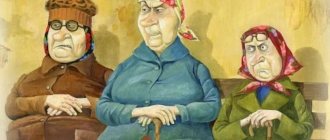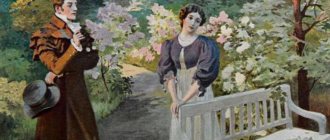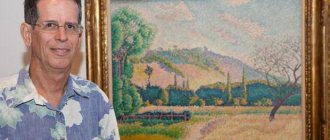- Essays
- 11th grade Unified State Examination
- Pride and humility examples and arguments from literature
Pride and humility are two concepts that are mutually exclusive. Pride is a heightened sense of self-esteem. Humility is the understanding and recognition of one’s own inferiority or mistakes. Both influence the development of a person’s character and actions.
We can recall several literary examples that prove this idea. There are a lot of heroes with a proud character: Evgeny Onegin, Pechorin, Andrei Bolkonsky, Raskolnikov.
Mtsyri - pride
Let us analyze the image of Mtsyri from the work of the same name by M.Yu. Lermontov.
As a child, Mtsyri enters a monastery. Remaining there as if in captivity throughout his life, the hero hatches a plan to escape. One day, during a terrible thunderstorm, he manages to escape from the monastery and for several days searches for his home, of which he has vague childhood memories. Unfortunately, Mtsyri got lost and returned to the monastery without finding the way to his village. The hero suffered from the infringement of freedom, he was glad to live with the elements in nature, which is why the dream of escaping from the monastery was so strong. Pride did not allow him to be a humble monk. Mtsyri, broken and sad, dies, unable to find in himself the desire to submit to fate.
Crime and Punishment - Humility
For an example of humility, let us turn to the work of F. M. Dostoevsky “Crime and Punishment.” The heroine Sonya Marmeladova has a difficult fate and the inability to fight this fate. The heroine submits to what happens to her. Her father is a heavy drunk who has lost himself, her stepmother is sick with tuberculosis. Circumstances in the person of her parents force Sonya to go to work on a “yellow ticket”. But even after becoming a prostitute, Sonya did not lose her kindness and compassion. The reader may wonder: why Sonya Marmeladova so humbly endures all the hardships of life and even goes to hard labor after Raskolnikov. Perhaps the answer to this question is this: humility does not always mean weakness. In order to act as Sonya does, sometimes courage is needed. Dostoevsky shows through the image of Sonya Marmeladova how important forgiveness and humility are.
Thus, in literature one can find various heroes showing two different human facets: pride and humility. The authors made the reader think about the actions of their heroes, they talked about the possibility and importance of forgiveness and defending one’s character and one’s dreams.
Old Isergil
A clear example of pride in literature is the work of Maxim Gorky called “The Old Woman Izergil.” This problem occupies a special place in the story. The main characters Larra and Danko are antipodes. At first glance, they have a common feature - they are both very proud, but this quality is somewhat different between the characters:
- Larra is soulless and selfish, grew up away from society. The hero demonstrates his own advantage in every possible way, believing that he is better than everyone else. Of course, this speaks of pride, which is a negative characteristic of the character. It is based on selfishness and arrogant attitude. One day a man killed a girl who refused him love. This once again demonstrates his negative qualities.
- Danko is merciful and brave. The troubles of the local residents pushed the man to action; he volunteered to lead everyone with him in search of a better life. Not everyone can take responsibility for the life and fate of an entire people. The character fairly assessed his own capabilities, realizing that he could save the tribe - this is where his pride lies. The hero achieved his goal and did not stray from the given path when people began to express their dissatisfaction.
Revealing the images of the heroes, the writer shows the difference between the terms “pride” and “pride”. As a result, the proud Larra was punished and forced to seek death for an eternity. Danko died as a hero, saving the people from death.
Should you be proud of yourself?
A secular person may not understand this position. We are brought up in the spirit of constantly striving to become better than others at something: tying our shoelaces more accurately, getting an excellent grade in school, enrolling in a prestigious university and getting a good job. Having the best, modern, expensive things makes a person successful in the eyes of society. Therefore, questions arise about what feeling an arrogant and vain person experiences: pride or pride controls his consciousness?
It is often said that the pride that drives us to gain recognition is not such a bad feeling. Thanks to pride, new technologies are developed and professional qualifications are acquired. For the sake of experiencing a positive emotion, people are able to work tirelessly.
To achieve the title of Olympic champion, athletes train to the limit of human capabilities. When one of them achieves a brilliant result, the media and fans only say that this is entirely the achievement of the champion. There are also examples of how an insignificant accident leads to injury and sometimes death of an athlete. But these are also the consequences of his pride in his strength or dexterity, the desire to reach even greater heights and receive another portion of fame and experience a new attack of self-satisfaction.
Are religions so wrong that they consider both pride and pride to be the same mortal sin? When achieving success in any business, you must always keep in mind the inexplicable fact that not everything depends solely on a person’s efforts. And even in legitimate pride, there can always be a little negative desire to look in the eyes of others as the best, superior to everyone who is not currently on the podium.
Pushkin's novel about Dubrovsky
The problem of pride and humility was also raised by Alexander Sergeevich Pushkin in the work “Dubrovsky”. The main characters of the novel are closely related to this theme.
At the beginning of the work, a conflict arose between Troekurov and Dubrovsky. The men have known each other for a long time, live nearby, and once even served together. Despite his poverty, Andrei was never afraid to defend his own point of view before the rich Kirila. Those around him never ceased to be amazed by this. In this case, pride is a positive quality.
One day, a conflict arose between the men, which Troekurov’s pride did not allow him to resolve. The hero could not admit his mistakes and apologize to his friend, whose honor was disgraced. As a result, litigation began between the characters. Andrei Gavrilovich’s heart could not stand the experience, and he soon died.
In this work, the issue of pride and humility also concerns Vladimir Dubrovsky. The man found out about the conflict only after his father’s funeral. Without thinking twice, he decided to take revenge on the offender - these thoughts were prompted by pride and the hurt honor of his entire family.
After some time, Vladimir fell in love with Troekurov’s daughter and abandoned revenge. So pride gave way to humility. Maria, who accepted the fact that her father married her to his friend, had similar characteristics. Although Masha could have run away with Dubrovsky, she accepted her unhappy and difficult fate.
↑ About Henry “The Gifts of the Magi”
Della and Jim found themselves in a difficult life situation: on Christmas Eve they did not have money to give each other gifts. But each of the heroes set a goal for themselves: to please their soulmate at all costs. So Della sold her hair to buy a watch chain for her husband, and Jim sold his watch to buy a comb. “The James Dillingham Young couple had two treasures that were the source of their pride. One is Jim’s gold watch that belonged to his father and grandfather, the other is Della’s hair.” The heroes of the story sacrificed the most important things in order to achieve the main goal - to please their loved one. READ THE GIFTS OF THE MAGIC
Eugene Onegin
In the novel by Alexander Pushkin, the problem of pride is closely connected with the heroine Tatyana Larina . Although at that time it was customary to tell a man about her feelings, she was very afraid of tarnishing her reputation. This act became for her a real manifestation of will and fortitude. The heroine had her own understanding of pride.
The same problem applies to the central character, who is characterized by self-confidence and pride. The epigraph of Pushkin's novel points to the pride and imaginary superiority of Eugene Onegin.
The writer once again raises this topic when he talks about the relationship between Lensky and Onegin. The latter knows that his friend has sincere feelings for Olga, but because of his arrogance, he still invites the girl to dance.
Of course, this situation offends Lensky, so he challenges Evgeniy to a duel. This act emphasizes the young man’s ability to defend honor and dignity. As a result of the fight, Vladimir dies. The ending of the relationship between the heroes is confirmation that pride and arrogance are unacceptable in friendship.
The theme of humility is also associated with Tatyana Larina. The girl bravely endures all the trials that fate has in store for her. She marries an unloved man, but remains faithful to him, even when Onegin confesses his feelings to her.
↑ L. Ulitskaya “Poor Relatives”
Lyudmila Ulitskaya recalls that her grandmother very often, before telling her anything, called her granddaughter to the middle of the room, because she was afraid of what the neighbors might tell. The title “Poor Relatives” perfectly conveys the climate in families of the fifties. While some are making plans for the future, trying to somehow arrange their lives, others simply love each other, living one day at a time and completely surrendering to their passion , as can be seen in the examples of Bronka and Irochka (Ulitskaya L.E. Poor relatives. - St. Petersburg: Mozaika, 2001. - 181 p.). The first one learned the secret of sin, went through humiliation, but was happy that she was loved and that she had children. The second one lived an absolutely correct life - everything is like everyone else, but for some reason, leaving Bronka, she understands that she missed something in her life. Ulitskaya presents us with vanity through the example of Simka, who loves to praise every thing she owns. For Simka, there is no better rag in the world than her own, there is no better person in the world than her late husband. She surrounds herself with a wall of pride, but at the same time all her pride is shattered in one minute and turns into hatred for her daughter.
Crime and Punishment
The clearest example of humility in the novel by Fyodor Mikhailovich Dostoevsky is Sonya Marmeladova . The girl is ready to sacrifice her own life for the sake of those around her, she is very kind and merciful. To earn money to support her father's family, Sonechka spends her last strength. After the death of her parent, the heroine does not leave his family, although she has no family ties with her.
The girl courageously puts up with all the trials of life. Then she once again sacrifices herself for the happiness of her loved ones. Sonya is a believer, so she does not allow herself to grumble at God for her difficulties and trials.
The heroine tries to instill humility in Raskolnikov. The beginnings of the main character's changes are directly related to his relationship with Marmeladova. Together with Rodion, Sonya goes to hard labor, where she preaches the idea of forgiveness.
Pride also manifests itself in Svidrigailov. He believes that those around him are no match for him, although in his heart he understands his mistakes. Before committing suicide, he does good deeds:
- arranges for Katerina's children to live in an orphanage;
- pays off her debts;
- helps with her husband's funeral.
In addition, the hero sincerely wants to bring Dunya to reason and dissuade her from marrying Luzhin. The latter lives according to the laws of selfishness and permissiveness. Svidrigailov’s behavior suggests that even proud people can admit mistakes and ask for forgiveness.
↑ About Natalya Korshunova from “Quiet Don”
Natalya's despair is boundless.
Life without Gregory’s fidelity and love has lost all meaning and value for her. Returning home, Natalya apologized to Ilyinichna, but firmly decided: “Whether I will live with Grigory or not is still unknown, but I don’t want to give birth to him anymore. And I’m pregnant right away, mom…” Proud, offended, she did not want to have any more children from her unfaithful husband. After an unsuccessful abortion performed by a village grandmother, Natalya dies.
The description of the last minutes of Natalya's life is brought to the deepest tragic tension in the novel. Life was quietly moving away from her, already submissive and suffering. She left behind everything that was most precious to her in this world: her children, her “only” Gregory. Before her death, she forgave him everything and still remembered and loved him. “Mommy, dress me in a green skirt, an enta, the kind with stitching on the frill... Grisha loved the way I put it on... and a poplin blouse...”
Saying goodbye to the children, she punishes Mishatka: “Father will come, kiss him for me and tell him to feel sorry for you...” Natalya gave her faithful heart to Gregory alone. The world of family happiness, which she created with such difficulty, which was the only meaning of her whole life, collapsed, and she died. “QUIET FON” SUMMARY
Captain's daughter
Alexander Pushkin in his story examines the concept of pride from several positions. It shows where true and false qualities can lead a person. In this work, Shvabrin and Grinev are faced with a choice:
- remain faithful to the Motherland;
- take an oath of allegiance to Pugachev.
The characters make their choices. Peter remains devoted to his native country; he cannot step over himself and submit to the impostor. The hero is on the verge of death and clearly understands this, but to deviate from the principles for him means to desecrate his dignity. The man ultimately chooses death. In this case, pride is synonymous with honor.
Alexey is closer to pride and vanity. He decides to support Pugachev, not only to save his life, but also to feel superior to others. The author specifically emphasizes the hero's arrogance.
Pushkin deliberately demonstrates two types of pride in the work. As a result, Pugachev helps Grinev, even though he does not take his side. On the contrary, he punishes Shvabrin.
Masha Mironova is a humble girl. When Grinev proposes marriage to her, the heroine refuses to accept the proposal without receiving the blessing of Peter's parents. But the latter are categorically against this marriage. Maria puts up with this without trying to go against fate. Later, she nevertheless found happiness with her beloved.
↑ I.S. Turgenev "Fathers and Sons"
The most important threads are connected with the parents of any person. The attitude towards father and mother is the litmus test by which a person’s morality is determined. Considering love to be physiology, Bazarov sees only instinct, an animal feeling in parental love. That’s why he languishes so much in his father’s house, and that’s why he doesn’t find a common language with his parents. Let's re-read the tragic scene of Vasily Ivanovich and Arina Vlasevna's farewell to Evgeny. After staying for three days, he became bored with their company. How spiritual is the love of old people for Enyusha! How they tried to accept him better, not to irritate him with excessive care! And what sense of self-worth sounds in the words of a mother, offended by her son’s betrayal, how she demands the same pride, the same courage from her husband. How she consoled him in his sorrow! “Fathers and Sons” Summary
↑ Becky Sharp from Vanity Fair by W. Thackeray
B.Sh. is a child of the “artistic” world, she is the daughter of an art teacher and a French “rope dancer”.
Thackeray repeatedly reproduces the signs of her appearance (not such a common technique in a 19th-century novel): she is small, red-haired, green-eyed. Depending on the task at hand, the heroine can be a “little mouse” and a charming heartbreaker - such transformations are as natural for her as the natural ability on occasion - to reveal humility and touching incompetence - to speak broken French, which she speaks perfectly. In part, she is comparable to the “she-wolf” Glafira from A.N. Ostrovsky’s play “Wolves and Sheep” - they are related by their cold, hypocritical and predatory nature, but in B.Sh. there is no readiness to enjoy life at all. The only thing that gives her pleasure is the next achievement of her goal. The heroine accepts defeat and loneliness courageously, although she only resigns herself after a desperate struggle. Meeting old acquaintances who do not want to recognize her, she smiles knowingly and ironically. LITERARY HERO BECKY SHARP Final essay 2019-2020 ARGUMENTS FOR THE FINAL ESSAY
↑ D.S. Likhachev “Letters about the good and the beautiful”
Love for your homeland is not something abstract; this is also love for your city, for your locality, for its cultural monuments, pride in your history. That is why teaching history in school should be specific - on monuments of history, culture, and the revolutionary past of one’s area. One cannot only call for patriotism, it must be carefully nurtured - to cultivate love for one’s native places, to cultivate spiritual settledness. And for all this it is necessary to develop the science of cultural ecology. Not only the natural environment, but also the cultural environment, the environment of cultural monuments and its impact on humans should be subject to careful scientific study. There will be no roots in the native area, in the native country - there will be many people similar to the steppe plant tumbleweed.
A.I. Solzhenitsyn "Matrenin's Dvor"
Story by A.I. Solzhenitsyn is ideally suited to the theme of humility (it involuntarily comes to mind that the whole movement was invented for the sake of it). “A village is not worthwhile without a righteous man,” this is the idea of the work and the core of Matryona’s image. And her righteousness is not a matter of acquisitions and humility. A woman accepts both injustice and insults without complaint. And this is not the learned humility of a person working on himself. This is her natural trait, which makes Matryona alien and incomprehensible to her fellow villagers. They willingly use her help, do not help her themselves and laugh behind her back, but she is not offended. They do not understand this, as does Matryona’s willingness to give up part of her house (the upper room) upon request.
Much in Matryona’s character seems strange to us, the readers. But we feel some kind of deep rightness of this woman. Now, if she had had a fight and refused to give up part of the house or demanded financial compensation for helping her neighbor, what would there be to write about? We are all like that. But she's not like that. I remember the words from the Bible addressed to the apostles: “You are the salt of the earth.” Salt is not food. Such humility is not the lot of many people, but of special people. But it is on them that a village, city or country rests. They are a moral peak, to which it is difficult to rise, but at which it is a shame to fall into the abyss of meanness, greed and evil.




